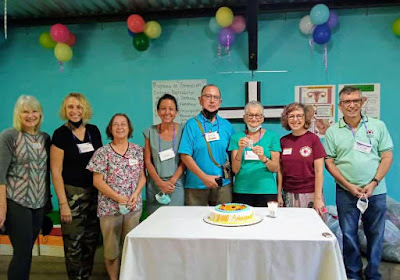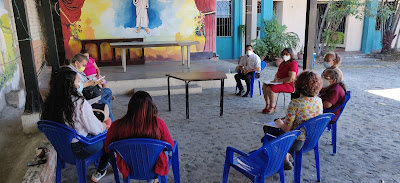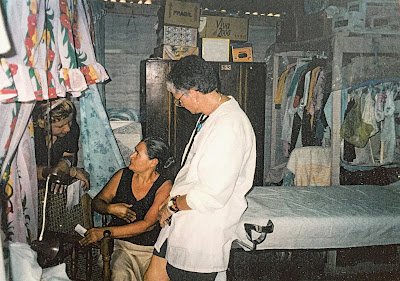From the Pandemic Emerges a New Era: A Mission of Healing Story in Several Parts
This is a story about the end of an era. We are reminiscent. We are thankful. We are relieved. We are proud. In February 2022, we celebrated 22 years of Missions of Healing in the northern region of the Salvadoran Lutheran Church. This was the last Mission of Healing North centered around the participation of a companion synod delegation. The preparations for the event took more than 6 months and the delegation was in El Salvador for 2 weeks. We are done. And we are not done. In a better-than-hoped-for way, the community health education plan begun during those 2 weeks is being implemented across the region by local teams. This is a "mission accomplished" success story with a happy trajectory.
 |
| Photo of the 2022 Mission of Healing North delegation. (Photo credit: Salvadoran Mission of Healing team) |
.JPG) |
| Photo of the 2000 Mission of Healing delegation. (2 team members not pictured) |
The idea for a new kind of Mission of Healing for 2022 evolved out of what we learned by attempting to do a year-long education series during 2021. Because of the pandemic, a delegation was unable to travel in 2021, so, instead of doing a health education fair as we did in 2020 (and previously), we developed monthly themes with videos and print materials which we sent out for duplication in El Salvador. A team on the ground delivered leader guides and participant materials to each of the 16 congregations in the north. We made it through September with this plan, and then decided we had done enough for the year. Over the course of 2021, some churches used all the resources as planned. Some churches combined efforts with other churches. Some did a workshop or two. At least one church did not use anything we prepared. We celebrated the successes. We solicited feedback from pastoral teams and received valuable information about what worked and what didn't work when communities tried to organize and run their own health workshops.
During the summer in 2021, I met with leaders in the northern micro-region and with Pastor Conchi, the Salvadoran Lutheran Church Health Ministries coordinator. We decided to plan an event for 2022 which could safely be held in the reality of the COVID-19 pandemic. We would call it "Formación de Formadores" or in English we used the title "Teach the Teachers." The general idea was to gather a small group of health educators (experienced and new) from each of the 16 Lutheran church communities in the north and to train, equip, and encourage them so they could run health education events throughout the year in their own communities.
The US team agreed to plan the training event and to organize a small, experienced delegation to lead teaching charlas* along with Pastor Conchi. The US team raised the funds needed to hold the Teach the Teachers event and to provide the participants with everything they would need to replicate the charlas in their communities.
From the get-go, in preparation for the Teach the Teachers Mission of Healing North, we placed a few important questions on the table:
1) Why does the Salvadoran Lutheran Church need help finding/writing curriculum? Wouldn't it make more sense for the materials to come from a local source and not to be developed by a US team?
Over 22 years of working with the Salvadoran Lutheran Church to improve holistic health and healthcare in poor Salvadoran Communities, our US team leaders have consulted with Salvadoran healthcare advisors to identify educational needs and to find free or inexpensive teaching resources. Leaders have gathered visuals and ideas from US and Latin American government web sites, children's education sites, and US clinic sites (such as The Cleveland Clinic). To make information accessible to people with limited health education, leaders have generally written their own charlas and had Salvadorans check them for understandability. Charla leaders have incorporated some materials produced by the Salvadoran Health Ministry, but unfortunately, the current Salvadoran government removed the archive of teaching materials from the Salvadoran Health Ministry web sites.
For 2022, updated materials need to be gathered from across the web, which is quite time-consuming, and Pastor Conchi did not have a team to help with that. In addition, from a didactic perspective, we decided that lesson plans, handouts, and teaching resources needed to be formatted in a way that lay-people could easily use them for teaching. The US team could offer that development from a professional, technological and time perspective, so we were asked to do that too.
2) Why would US team members teach the teachers, instead of Salvadorans who have received previous training?
We have worked very hard, particularly in the past 10 years, to focus less on medications and more on educational charlas and to have the majority of charlas led by Salvadoran medical professionals and health promoters (from within and outside of the Lutheran Church). This has not always been easy. The culture of the medical brigade coming in, doing quick check-ups and handing out medications is pretty well-cemented in El Salvador. Don't get me wrong, that is how our Mission of Healing started, and 22 years ago direct care was very much needed in the northern region where we work.
Before that first Mission of Healing, the local doctor and local pastor gave direction to our team, which focused on treating infections, providing pelvic exams, doing PAP tests, teaching how to prevent sexually transmitted illness, and doing Bible Study activities with children. In 2022, we were asked to help create curriculum and lend our voices to particular topics, as well as provide a few appropriate incentives for the community leaders to give out when they did their replica workshops on their own. Twenty-two years ago, families in poor communities had little or no access to healthcare and no access to medications. Today, there are multiple labs, imported medications, generics and the ability to purchase EVERYTHING over the counter in small quantities. Doctors in the region ask us to encourage people NOT to medicate themselves and to teach how to use prescribed medications properly. Anti-biotic resistant bacteria is a HUGE problem in El Salvador, and lending our voices to that message brings more attention to it.
 |
| The first Mission of Healing: Women registering with a local nurse prior to receiving pelvic exams. Not one woman had ever had a PAP test. |
Planning the 2022 Teach the Teachers Workshops
Since 2014, we have been intentionally working toward working ourselves out of a job (but not out of relationships with our sister churches, just to be clear). A Mission of Healing which happens once per year can provide a "booster" to local health education initiatives, but is not a sustainable way in which to provide ongoing, reliable community health education. It can be a way to conduct one-time, basic health screenings, but certainly is not a sustainable way in which to provide healthcare.
A few months into 2021, we could already see how regular, lay-led teaching workshops held in the churches helped to make health and wellness information more accessible to a broader group of kids, youth and adults - and not just to those enrolled in health-promoter training. We weren't really sure what barriers prevented the health promoters from doing more teaching in their communities. As happens frequently in El Salvador, there seems to be lots of training and not so much implementation. We decided to go into this with a full "¡sí, se puede! yes, you can!" attitude - yes, you do this in your communities!
Creating a Welcoming Teaching and Learning Space
- Of the 16 northern region churches, some have health promoters with years of training, some with less training, and some have never participated in promoter training. The training, part of the Salvadoran Lutheran Church's Health Ministries, is coordinated by Pastor Conchi and funded through Global Health Ministries. Our goal was to respect the knowledge and training of those with experience, and also create a safe space for those with no experience to come and learn.
- Each church could designated 2-3 people to attend Teach the Teachers. The requirements for participation were: ability to read, a desire and capacity to learn, the desire to help families in their own community improve in health and wellness, and the commitment to replicate the workshops in their home church.
- The US team was made up of experienced Mission of Healing delegation members, three of whom, including myself, were the planners and members of every delegation since 2000. The US team and Pastor Conchi were set up as "the teachers," and we worked on being interactive and creating open spaces for sharing. (We practiced our charlas with each other.)
- Feedback from experienced health promoters helped us to create new, engaging, creative materials so to avoid the feeling of "we get the same old material every year."
- Due to COVID, we decided to hold the Teach the Teachers training at 2 sites, ideally with 20 participants at each site. The locations were at the church in Colon, Guazapa which has a big, covered, outdoor space and in Los Héroes, Tonacatepeque which was the site of the first Mission of Healing and has two large spaces with big windows.
- With Pastor Conchi's advice, we settled on developing a series of charlas on each one of four human body systems: Digestive, Circulatory, Respiratory and Reproductive. Each system study included a general charla with anatomy and physiology, 4 specific charlas and a Bible Study.
- The schedule was designed in a way that would allow participants to juggle work, family and training. We spread the training sessions over 2 weeks, with 2 days per week for each group. The Colon group had their 4 sessions (1 for each body system) on Tuesdays and Thursdays. The Los Héroes group had their 4 sessions on Wednesdays and Fridays. This left Monday open for the pastors to keep their commitments with the synod (national church) on that day.
- We provided breakfast and lunch, made by the host communities, and a small transportation stipend for those live far from the main road. We had the synod van pick people up along the main road.
- We took into consideration gang territories when organizing the 2 participant groups.
The logistical and curriculum plans were finalized in September 2021. The US team met by Zoom, and worked on writing curriculum from August 2021 through January 2022. In the midst of creating and organizing materials, we realized we really needed a specific plan for the 2-week Teach the Teachers training event as well as a workable implementation plan for the trained promoters to use in their replica workshops in the communities. As will happen, a Sunday morning in Los Héroes led to an idea which was key in making this whole thing work. More about that in the next chapter of the story.
 |
| Meeting in January with Pastor Conchi and leaders from the northern micro-region to work out final details for the Teach the Teachers event. |
*charla means a teaching chat, an interactive, educational presentation




Beautiful ministry! Easter blessings!
ReplyDelete